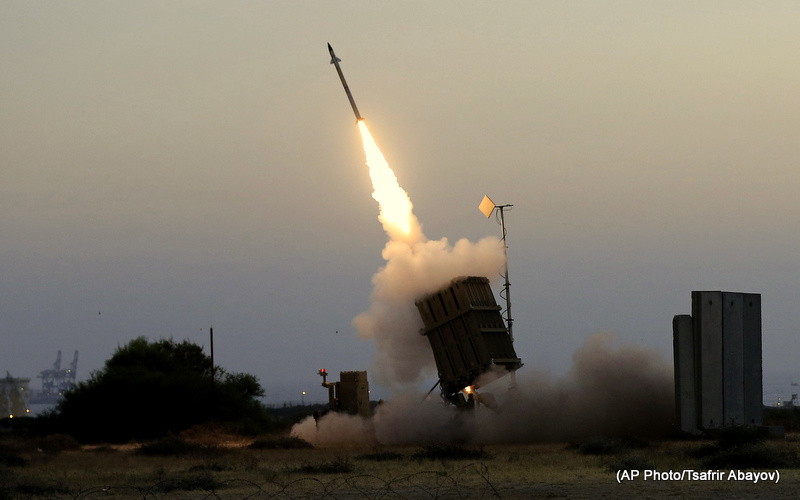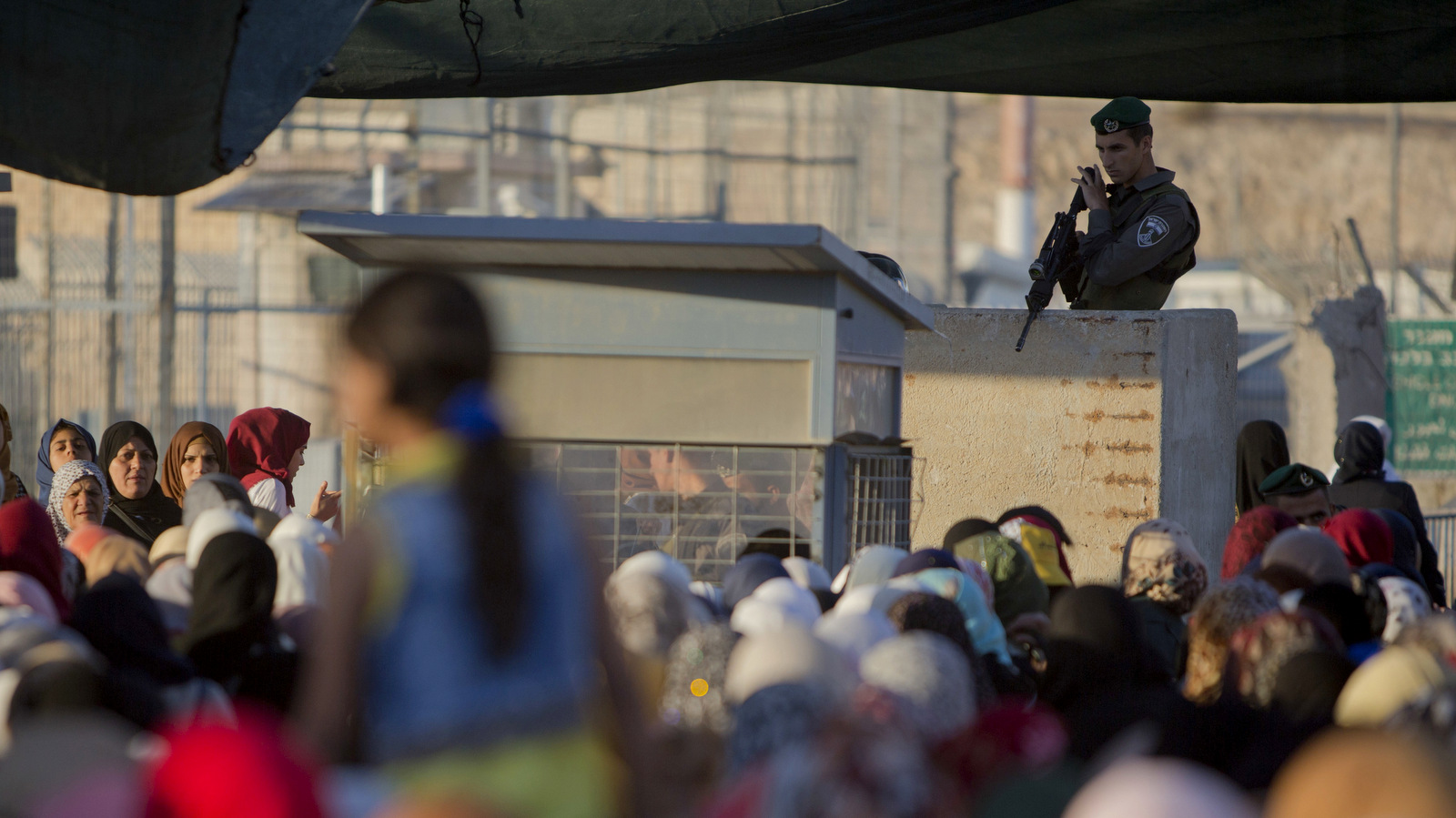Hopeless in Gaza? A Talk With Controversial Scholar Norman Finkelstein
LOS ANGELES — “The nadir of the Palestinian struggle is now,” says distinguished but controversial scholar Norman G. Finkelstein. He spoke on March 26 at the University of Southern California Annenberg School for Communication and Journalism. “Nothing is happening there in Palestine. There is no mass resistance.”
That explains why worldwide the pro-Palestinian cause is not drawing the crowds it once did. It also explains why the USC auditorium was at most half full. As Finkelstein surveyed the audience, he pointed to one college-age man in the front row, observing that he was by far the youngest person in the room. In Gaza today, 51 percent of the population is under 18 years of age. Half of Gaza’s people would be younger than this young man.
However, if the martyrdom of Gaza seems right now to be sealed in the pages of history, “We don’t know what will come tomorrow,” says the author, on a tour to promote his newest book, Gaza: An Inquest into Its Martyrdom. “So we must keep preparing the ground.”
Author of more than a dozen books, Finkelstein is confident of his expertise on the Israel-Palestine issue, quoting verbatim from his wide range of sources. Yet he presents himself as soft-spoken, calm and reserved, never raising his voice excitedly, and always deferential to his questioners. He appeared in “A Conversation on Gaza” with Sandy Tolan, USC Annenberg professor of journalism, and author of The Lemon Tree: An Arab, a Jew, and the Heart of the Middle East. When someone from the audience wondered why USC was willing to present Dr. Finkelstein when practically every other institution of higher learning has turned him down for fear of controversy (and reduced contributions, no doubt), Tolan affirmed that USC stood by a principled position for free speech.
A local organization called The Markaz, which deals with the culture and politics of the Middle East, cosponsored the open forum, along with CODEPINK: Women for Peace and a number of private donors.
Gaza is among the most densely populated places in the world, more even than Tokyo. Seventy percent of its two million inhabitants are refugees: By international law, the children and descendants of refugees are also characterized as refugees until they are settled someplace with residence and citizenship rights. Since Israel occupied Gaza in 1967 during the war in which it also acquired the West Bank and the Golan Heights (and the Sinai, since returned to Egypt), it has systematically de-developed the economy. Finkelstein goes so far as to to say, “Gaza has no economy”: In other words, its productive capacity has been destroyed.
After Hamas won democratic elections in 2006, Israel intensified its blockade of Gaza, and after Hamas consolidated its control of the territory in 2007, Israel tightened its siege—“inhuman, illegal, immoral,” in Finkelstein’s words—another notch. In the meantime, Israel has launched no fewer than eight military operations against Gaza—culminating in Operation Cast Lead in 2008–09 and Operation Protective Edge in 2014—that left behind over three million tons of rubble. Recent UN reports, citing the poisonous drinking water Gazans are forced to consume, predict that Gaza will be uninhabitable by 2020.
Watch | Norman Finkelstein on the Many Lies Perpetuated About Gaza
Finkelstein refers to the work of “master of detail” Noam Chomsky as his inspiration. Chomsky has consistently published books of deeply radical import, but always with meticulous documentation and footnoting. Work of that level of criticism of the establishment’s received ideas must be capable of being defended. There is no room in such studies for vague, unprovable assertions.
With those criteria in mind, Finkelstein painstakingly researched his devastating inquest into Israel’s actions of the last decade. He argues that although Israel justified its blockade and violent assaults in the name of self-defense, in fact these actions were cynical exercises of brutal power against an essentially defenseless civilian population. Based on hundreds of human rights reports, his new book scrutinizes the many flagrant violations of international law Israel committed both during its operations and in the course of its decade-long siege of Gaza. “I want to convince the broad public,” the author says. “I want to invest in demonstrating the details.” Prof. Tolan counted over 1200 footnotes in the study, averaging three per page.
War crimes?

Palestinian medical personnel treat a wounded girl at the emergency room of the Shifa hospital in Gaza City following a 2014 Israeli bombing campaign.
When we think “refugees” from war, disaster or oppression, images of large numbers of people come to mind, crossing borders, departing on the last flights out, fording streams, boarding leaky transport ships, washing ashore. That what’s completely different about Gaza: The borders are sealed and there is no place to flee. The population is trapped in a tiny sliver of land equal in size to twice the District of Columbia. Some have named it “the largest open-air prison in the world,” but others claim that implies guilt on the part of the inmates, preferring bluntly to call it a “concentration camp.”
Many critics of Israel have condemned the Zionist state for its “disproportionate force” against Gaza, or for the overwhelming “collateral damage” of indiscriminate killing in seeking out “terrorists” and Hamas officials. These are in and of themselves war crimes by international law. Many of those charges Israel dismisses, falling back on the “fog of war” argument. But Finkelstein takes his argument a step further, documenting the targeting of civilians as such, a charge that international human rights organizations are hesitant to levy against Israel for fear of loss of legitimacy, standing, or in the case of academic people, their careers. Finkelstein himself has not held an academic position for over eleven years not because his scholarship is in question, but because of institutional wariness of hiring him.
Such was the case with Justice Richard Goldstone, the South African Jewish author of the United Nations report on Operation Cast Lead, which highlighted the Israeli military’s objective to punish, humiliate and terrorize the Gaza population. An outraged Israel, and its allies, worked hysterically to discredit that document. Goldstone was pressured to “recant” his conclusions in 2011 owing to the surfacing of “new information,” whose existence Finkelstein doubts. Goldstone was simply intimidated, and in Finkelstein’s opinion, possibly blackmailed.
Later Israeli military operations in Gaza elicited far less criticism out of this fear of facing that nation’s aggressive public relations offensive.
A group of Israeli military veterans called Breaking the Silence has made a project of recording soldiers’ actual experiences in Israel’s wars, warts and all. Israel has come down especially hard on this group, calling them traitors and liars out to delegitimize the country. In fact, their eye-witness reports were horrifyingly accurate, putting paid to Israel’s oft-repeated claim that it has “the most moral army in the world.” But in reading them, says Finkelstein, he also found no expressions of remorse about their actions in Gaza. Homes and neighborhoods were systematically bulldozed and bombed, leaving residents with nowhere to go. Orders were to destroy and kill everything that moves, and everything that doesn’t. Even if residents fled the announced bombing zone, they would be attacked on the road out.
If Breaking the Silence is silenced, “the next time Israel attacks,” says Finkelstein, “there won’t be any credible witnesses.”
What about the rockets and missiles?

An Iron Dome air defense system fires to intercept a rocket from Gaza Strip in the costal city of Ashkelon, Israel, Saturday, July 5, 2014.
The author spent some time in his remarks speaking about the right of self-defense. Again he reverted to international law concerning occupation, which allows an occupied people to resist, even militantly, and limits the occupying force’s prerogatives. As to the standard question Israel poses, “What would you do?” if Mexico or Canada or Cuba were raining down rockets and missiles on the U.S., Finkelstein turns that around. What would Palestinian parents do knowing that with each sip of water, their children are being poisoned, their agricultural lands are being uprooted, their hospitals failing for lack of power?
And what about those rockets and missiles? Israel claimed that in the 51 days leading up to Protective Edge, 5000 rockets were fired from Gaza into Israel. Fortunately, says Israel, 90 percent of them were deflected by the Iron Dome technology supplied by the U.S. But Finkelstein disputes these numbers. In the first place, he says, Iron Dome functions over urban areas, while most of the rockets would have been aimed at and would have landed in more sparsely settled areas adjacent to the Gaza Strip. If even 10 percent of the rockets got through, how much damage did they create? Finkelstein says Hamas rockets destroyed exactly one Israeli house. Now, both Israel and Hamas have an interest in inflating the numbers of rockets fired—Israel to exaggerate the attack on the Israeli civilian population, and Hamas to impress with the power of its resistance capability.
But according to Finkelstein, neither version is true: What people in the vicinity were hearing was nothing more than firecrackers. For all practical purposes, he says, the rockets “never happened.” He also says the story about the terrorist tunnels Hamas created to bore into Israel has also been blown out of proportion, and that Hamas never aimed to attack civilians in Israel, only the military. He also questions the vaunted efficacy of Iron Dome.
Readers will have to go to his book to see the evidence he adduces to make such claims. But it is easy to see why, flying in the face of all that Israel says, and that most governments and media accept, what Finkelstein says is so contrarian as to elicit condemnation. But he sticks by his views and welcomes challengers who will, as he claims to do, rely on factual evidence alone and not be swayed by nationalistic loyalties or other emotional criteria.
One state vs. two

Palestinian women wait to cross the Qalandia checkpoint near Ramallah, a checkpoint only Palestinians are required to use, June 17, 2015. (AP/Majdi Mohammed)
In the Q&A, Finkelstein held forth on several further points. To the surprise of many in the audience, Finkelstein is not a friend of BDS — Boycott, Divestment, Sanctions —the strategy adopted worldwide to try to force Israel to negotiate in good faith with the Palestinians for fear of losing markets, investments and economic ties with trading partners. He claims that the BDS movement takes “no position” on Israel’s right to exist as a nation, which is hypocritical and inconsistent because in effect it supports the one-state solution. If BDS favors Palestinians’ right to a state as a matter of international law, then it is only consistent that they should support Israel’s right as well. He is critical of the one-state advocates as being out of touch with the professed goal of all previous international agreements and with every single government in the world. The “one-staters,” he says, are mostly “liberal arts professors.”
A questioner asked about the future of Israel as a faith-based nation. Right now, Finkelstein answered, Israel is “a very ugly, very mean place.” But change does happen. Look at Germany and Japan: In international surveys, they both place near the top of the list of peaceful nations in the world.
About the future of progress toward two sates: It’s “currently dead,” he says. “But so is everything.” According to Gandhi, Finkelstein recalls, public opinion is moved not by noble words and manifestos, but rather by official displays of violence, heads beaten and killings. The Supreme Court’s 1957 Brown vs. Board of Education decision did not desegregate schools: A decade later, only one percent of Southern schools were integrated. It took the militancy of the 1960s civil rights movement, with the fire hoses, the murders, the jailings, the marches, to demonstrate the historic necessity to move forward. In his estimation it will likely have to come to that in Palestine, but right now people feel numbed and cynical.
Finkelstein rejects the familiar Israeli claim that they have “no partner for peace” on the other side. The PLO has been that partner since the 1970s, and each time a final agreement seems near, Israel finds a way to scuttle it. In various peace accords Palestine and the other Arab nations have shown their willingness to recognize Israel if Israel will negotiate a settlement based on the 1967 borders. He is convinced that even on as touchy an issue as the right of return, “with a full package, the Palestinians would be reasonable.”
Eric A. Gordon is the author of a biography of radical American composer Marc Blitzstein, co-author of composer Earl Robinson’s autobiography, and the translator (from Portuguese) of a memoir by Brazilian author Hadasa Cytrynowicz. He holds a doctorate in history from Tulane University. He chaired the Southern California chapter of the National Writers Union, Local 1981 UAW (AFL-CIO) for two terms and is director emeritus of The Workmen’s Circle/Arbeter Ring Southern California District. In 2015 he produced “City of the Future,” a CD of Soviet Yiddish songs by Samuel Polonski.
https://www.mintpressnews.com/hopeless-in-gaza-a-talk-with-scholar-norman-finkelstein/239830/

0 Comments:
Post a Comment
Subscribe to Post Comments [Atom]
<< Home